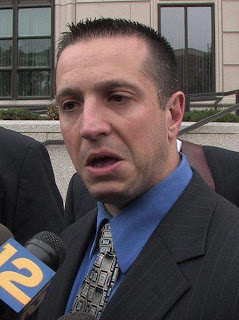 Caveat lector: This post contains some subject-appropriate unsavory language.
Caveat lector: This post contains some subject-appropriate unsavory language.Nothing to see here -- just move along: Irma Marquez, who was not abused by Yonkers Police Officer Wayne Simoes, recuperates from the non-abuse she didn't experience at his hands. At the time this photo was taken, in fact, Marquez stood accused of "disorderly conduct" and second-degree obstruction of governmental administration.
He's drunk again, it's time to fight; she must have done something wrong tonight....
"Hey, it's no big deal -- I just slipped and hit my face on a doorknob," said Joy by way of explaining the huge contusion discoloring her face.
This wasn't the first time she had shown up to work with a black eye or other suspicious injury she insisted was the product of some bizarre accident growing out of her incurable clumsiness. Curiously, Joy was not noticeably maladroit when tending to her duties as a waitress for a chain restaurant where I worked while going to college.
A plain but very nice woman on the wrong side of 35, she was easy to work with and put in long hours to help keep her household afloat. She lived with an unemployed, live-in "fiance," or what I called a "degenerate freeloader."
Whenever Joy would come to work bearing the visible evidence of a beating and urging us to believe some elaborate tale of innocent self-inflicted misfortune, none of us believed her. But none of us had evidence sufficient to justify prying into her domestic affairs, and she reacted so badly to the broad hints several of us dropped that we didn't persist.
 Another view of the aftermath of the non-abuse experienced by the oddly unfortunate Irma Marquez.
Another view of the aftermath of the non-abuse experienced by the oddly unfortunate Irma Marquez. Just tell the nurse you slipped and fell; it starts to sting as it starts to swell....
Unlike many episodes of suspected domestic abuse, there is no ambiguity in the case of Irma Marquez, a 45-year-old woman from Yonkers, New York. She was physically assaulted, in public, in front of several witnesses; the incident was captured clearly on a surveillance videotape.
The abuse resulted in "a head injury with related loss of consciousness, memory loss, jaw fracture, two black eyes, facial contusions, severe swelling and bruising, hemorrhaging in both eyes, lacerations to the nose, chin and mouth, neck and back pain, bruising and/or lacerations about the back, arms, hands, right knee, right leg, right hip, [and] right breast...."
Were we to take seriously a verdict by a federal jury, the injuries sustained by Marquez were immaculately inflicted. No other human being is responsible -- according to that jury -- for the wounds that disfigured the 44-year-old home health worker. That's because she was injured at the hands of a police officer, who was never charged with criminal assault.
On Wednesday (May 26), a federal jury ruled that Yonkers Police Officer Wayne Simoes didn't
violate Marquez's civil rights when he lifted her from her feet and slammed her face-first into the floor of the La Fonda restaurant on March 3, 2007.
***
***
Simoes was one of several police officers dispatched to deal with a drunken melee at La Fonda. When they got there, Marquez -- who had obviously had a bit too much to drink -- was concerned about her niece, who had been injured in the brawl.
As medical workers attended the young woman, Marquez -- out of understandable concern, but with dubious judgment -- stooped down to get a better look. She was pushed away, stumbling into a couple of officers, including Simoes.
Marquez, who was unsteady on her feet and visibly uncooperative, should have been escorted out of the room. There was no reason to arrest her. A generation ago a conscientious police officer would have displayed sufficient patience and self-restraint to remove her from the room without strong-arm tactics.
Simoes, on the other hand, clearly subscribes to a doctrine of more recent vintage under which any lack of immediate, servile compliance by a civilian is to be treated as a criminal offense and grounds for arrest -- if not potentially lethal force, as in eletro-shock torture administered via Taser.

The videotape shows Simoes starting to jack Marquez's arm behind her back in order to handcuff her. Given the lack of legal justification for the arrest, this was an act of criminal battery.
He then compounds that offense by bear-hugging her from behind, shifting his footwork under perfect control, and then picking her up and face-slamming her to the floor. This was a move Simoes had probably practiced on many occasions, and most likely was simply dying to use on someone. What better subject than a small, drunken, middle-aged female?
Notice the reaction -- or the lack thereof -- by the other police officers on the scene: A woman has just been violently face-planted into the floor, and she lies bleeding at their feet, yet none of them moves to render aid, or to rebuke her assailant. Simoes followed up his attack on Marquez not by checking to see if she was all right, but by placing his knee in her back and handcuffing her.
Testifying at the trial, Officer John Liberatore stated that Simoes clearly used excessive force against Marquez. He also recalled asking his partner, Officer Todd Mendelson, "What the f*** just happened?" Mendleson's reaction was an indifferent shrug.
When the defense pointed out that Liberatore hadn't offered the same account to internal affairs investigators prior to the trial, he replied, quite plausibly, that he was reluctant to "point a finger at a fellow officer." It's hardly surprising that Liberatore's reluctance disintegrated when he was compelled to testify under oath and liable to perjury charges if he withheld the "whole truth."
Captain Edward Geiss, the on-scene commander, testified that although he didn't "think he intended to hurt her the way he did," his first reaction after seeing Marquez's bloodied face was to summon an Internal Affairs team to the scene.
Simoes' defense counsel, which mocked the prosecution's case as a matter of "just press play," enlisted the help of "expert witness" Grant Fredericks, a former FBI analyst, whose job was to provide a "narrative" for the video compatible with the defense's argument. In plainer terms, his job was to obfuscate what was clearly shown by laying down a dense fog of double-speak.
Fredericks insisted that the video's capture speed was inadequate to capture critical details; this was essentially an invitation to accept his word that he discerned evidence of "things unseen" that prove Simoes had slipped and dropped Marquez, rather than throwing her to the floor.
After planting that suggestion, Fredericks broke down the video clip into into more than one hundred still photos, insisting as he reviewed them that the demonstrated that the officer had lost control once he had taken Marquez off the floor. But neither he, nor any other defense witness, explained why Simoes had picked the woman up in the first place.
Leaving aside the fact that the video clearly shows that Simoes was sure-footed during the entire attack, once he had placed violent hands on Marquez and removed her from the floor, he became responsible for whatever happened to her as a result of his actions. That's how the matter would have been treated if it had involved someone who didn't wear a state-issued costume.
The prosecution countered Fredericks with its own FBI-trained "expert" video analyst, Alan Fuller. Furthermore, the trial judge, Kenneth Karas, instructed the jury to disregard Fredericks' assessment of Simoes' actions. This effectively left the defense without a case.
Nonetheless, the jury of twelve good men and true -- actually, eight men and four women -- acquitted Simoes on the basis that they couldn't determine his intent to injure Marquez on the basis of his documented actions. Again, it's impossible to believe that the jury would have been inclined to draw such sophistical pseudo-Kantian distinctions if the accused had been anyone other than one of the state's consecrated agents of holy violence.
"I have always had faith in the justice system," smarmed Yonkers mayor Phil Amicone following the trial. "In this case, a verdict was rendered by twelve people who found that there was no act of excessive force."
With that in mind, look at Irma Marquez's face once again. Apparently, the injuries she sustained were the product of proportionate force, used to deal with a distraught woman whose "offense" was to take excessive interest in the well-being of her niece.
This brings us to the crowning injury inflicted by Simoes on his victim: While Marquez was bleeding at his feet, Simoes was preparing to file criminal charges against her for "disorderly conduct" and second-degree "obstruction of governmental administration."
The former isn't a crime, in anything other than a positivist sense, unless it interferes with the rights or property of another individual; the latter is quite frequently a moral obligation. Beating a woman bloody is not "proportionate" force for dealing with those "offenses," either jointly or separately.
Even though Westchester County District Attorney Janet DiFiore didn't see fit to file criminal charges against the bully who face-planted Marquez, she zealously prosecuted the victim on spurious criminal charges that were quickly disposed of by a jury in May 2008.

High-gloss hypocrite: Westchester County District Attorney Janet DiFiore.
Before becoming D.A., Janet DiFiore "lectured extensively" on, inter alia, domestic violence. She also served as a family court judge and served on the County Commission on Domestic Violence.
In fact, her campaign literature boasted of the fact that as a family court judge DiFiore had presided over "hundreds" of domestic violence cases.
I sincerely doubt that any of those previous domestic violence cases involved prosecuting the victim for supposed offenses against the assailant.
She looks at you, she wants the truth; it's right out there in the waiting room;With those hands lookin' just as sweet as he can....
As is so often the case when men abuse women, Simoes reserved all of his sympathy for himself. During his trial he was frequently seen weeping -- not over what had happened to Marquez, mind you, but rather over his own predicament as a poor, misunderstood public servant.
Simoes wept again following his acquittal, his chronic lachrymosity yielding to bile as he assailed those unspecified people he held responsible for "all the garbage you guys put me through."
Take Simoes out of his official costume or his well-tailored suit, put him in a wife-beater, and move the scene of the crime from the backroom of a restaurant to the kitchen of a private home, and imagine how that self-pitying statement would be received. No, he wasn't drunk in the conventional sense when he assaulted Irma Marquez, but he was certainly intoxicated with a sense of his own power.
All of this happened in Westchester County, New York -- Hillary Rodham Clinton country, a haven of progressive enlightenment and exquisite sensitivity to "sexism."
It's entirely likely that there are men from that part of New York who have been convicted of, and imprisoned for, domestic abuse charges that don't involve anything nearly as serious as the injuries inflicted on Irma Marquez. There are certainly plenty of such cases elsewhere in this country. But they're different, you see, because the accused in each case wasn't an agent of the state's divine will.
Wayne Simoes, petty thug and unpunished abuser of women, prefers to be called by the supposedly exalted title "Officer." Assuming that there is anything innately honorable in that designation, the term can be appropriately (if somewhat awkwardly) worked into a paraphrase of an entirely appropriate lyric from one of my favorite workout songs:
[Officer]'s a name you haven't earned yet
You're just a child with a temper
Haven't you heard `Don't hit a lady'?
Kickin' your ass would be a pleasure.
(Warning: The following performance includes some unfortunate language.)
***
***
Dum spiro, pugno!



















